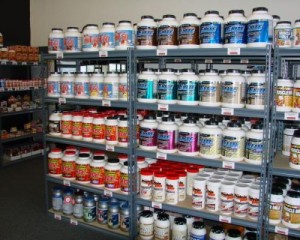 I fully believe that to reach a balanced diet and receive all the nutrients that you need on a daily basis, eating a variety of foods is adequate and there is little need for supplements. However, in certain situations like illness, low energy intake (for weight loss) or limited food availability, supplements may be required to fulfil nutritional requirements. Athletes are also an exception – high energy demands and a lot of stress on the body, not to mention the need for a swift recovery in between sessions, may make supplements and sports foods a necessity.
I fully believe that to reach a balanced diet and receive all the nutrients that you need on a daily basis, eating a variety of foods is adequate and there is little need for supplements. However, in certain situations like illness, low energy intake (for weight loss) or limited food availability, supplements may be required to fulfil nutritional requirements. Athletes are also an exception – high energy demands and a lot of stress on the body, not to mention the need for a swift recovery in between sessions, may make supplements and sports foods a necessity.
There is a lot of confusion about whether supplements and sports foods are safe or effective, so I will try to dispel any myths in this blog. However, if you have any questions regarding a specific supplement or food, please feel free to contact me.
My speciality is in the world of whey protein*, so I think protein sports products are a good place to start.
The Benefit of Protein Products
The main two reasons for using protein products are quality and convenience.
Quality – many protein products contain proteins that are high in all the essential amino acids, the nutrients you need to build and repair your muscles post-exercise.
Convenience – this is the number one reason for taking these products. Generally speaking, most sources of protein, like meats or eggs, are quite hard to take with you in your training bag and have on the side of the pitch. Protein products, whether it is a shake or a bar, are a lot more convenient and thus give you an option to have soon after training or matches – when we most need protein for muscle replenishment.
Which Protein Product Should You Choose?
High protein sports foods come in various forms, but mainly shakes and bars. You should choose something that you are comfortable with and enjoy, however, there are a few factors that you should be aware of:
1. The source of protein used – different proteins have different quality ratings. The main proteins used in these products are milk proteins (whey and casein) and soy protein. Milk proteins are considered very high quality; they have significant amounts of all the essential amino acids and are utilised effectively by the body. Whey protein is absorbed quickly whereas casein tends to coagulate in the stomach and therefore is absorbed more slowly. Many athletes, therefore, have whey protein soon after exercise when the body rapidly replenishes muscle protein, and casein in the evening to feed the body with the protein it needs to do work overnight. Whey protein also has one of the highest leucine contents, an amino acid that kick starts the muscle protein synthesis. Soy protein is slightly lower in quality however still contains all the essential amino acids – just not quite as much.
2. Know your ingredients – a lot of products tend to have a vast range of ingredients – do your research and make sure you know what you are feeding your body and muscles.
3.  Is the product “safe”? – One way in which you can check for safety, in terms of banned substances, is by checking for an Informed Sport Accreditation. Brands which have an informed sport logo (right) have been tested for, and shown not to contain prohibited substances. You can also look at this website to see which companies are registered and have the Informed Sport Accreditation on their products http://www.informed-sport.com/registered-products . You can read more about this topic on Chris Curtis’ blog here.
Is the product “safe”? – One way in which you can check for safety, in terms of banned substances, is by checking for an Informed Sport Accreditation. Brands which have an informed sport logo (right) have been tested for, and shown not to contain prohibited substances. You can also look at this website to see which companies are registered and have the Informed Sport Accreditation on their products http://www.informed-sport.com/registered-products . You can read more about this topic on Chris Curtis’ blog here.
Protein for General Health
Protein is also needed for many other functions in the body, for example it is one of the main constituents of our bones. Therefore protein products, like whey protein powders, do not have to be limited to sports athletes. Protein powders can be easily mixed with fruit, oats and milk to make a healthy breakfast smoothie, so they can be enjoyed by friends and family too!
Adding creatine
Understandably, rugby players often don’t want protein just to help them recover, but also to help them build lean muscle when used in conjunction with a strength training programme. One of the very few other supplements that has been proven to be efficacious, and have minimal side-effects, is creatine. Creatine phosphate is a major energy source for high intensity exercise such as weight training. Stores of creatine are limited, and food sources (such as meat and poultry) only contain small amounts of creatine, thus supplements can be used to increase creatine phosphate in the muscle. Supplementation supports lean mass gains, enhanced power output and also helps speed up recovery between sprint or power sets.
How much creatine – it is generally recommended that athletes utilise a loading phase of 15-20g per day for 4-7 days, followed by a maintenance phase of 2-5g per day.
If you are on a weight maintenance diet, be aware that creatine supplementation can enhance the amount of water stored in the muscles and thus weight gain can occur.
Are there any other supplements to be aware of?
In terms of sports performance, there are few supplements which have good evidence that support them having a significant positive effect. The main one used in rugby has already been covered, creatine.
There may be certain situations in which players may wish to consume vitamin or mineral supplements. For example, if they go on tour to a country where there is limited food availability, or if their intake of food is restricted due to illness.
Also Vitamin D may well be deficient in the winter months, especially when training is cancelled and the time outdoors is limited. Thus, athletes should keep an eye on their levels through blood tests, and perhaps talk to their GP about supplementation. Vitamin D is important for good bone health, among other things.
In terms of enhancing the immune system and preventing illness, there is little evidence to suggest some antioxidants originally thought to be useful for this (e.g. vitamin C) have much of an effect.
Rather, the most important thing here is to make sure you maintain adequate carbohydrate intake. New research is also suggesting an effect of polyphenols and flavonoids (fruit and vegetable extracts), of which Quercetin seems to be one to watch!
Supplements specifically for women
Of course, all of the aforementioned sports foods and supplements can be used for women’s performance and health too; however there may be specific supplements beneficial to women.
One important additional supplement for pre-menopausal women may be the mineral iron. Iron deficiency occurs in men, but is most common in females, due to the effects of the menstrual cycle.
Iron is a key nutrient used in the red blood cells; it makes up part of the haemoglobin which is the protein that carries oxygen around the body. Thus iron deficiency can lead to anaemia and can cause unexplained fatigue. If concerned, blood tests should be taken to monitor levels and advice on supplementation needs should be discussed with your GP.
Iron is found in meat, dried fruit and some vegetables and so these foods should be regularly consumed however supplementation may be necessary if deficiency occurs.
I hope this helps to give a slightly clearer picture how sports foods and supplements can work with you to enhance your performance and health. Any questions please feel free to contact me by emailing info@findrugbynow.com or by leaving a comment below.
Sophie
*I work for a company called Volac, Europe’s leading manufacturer of nutritional whey protein. Volac Lifestyle Nutrition has a consumer division called The Good Whey Co. which sells flavoured whey protein powders to the general health market.








 When most people hear the word “Peloton” they think of an expensive black bike with shiny red buttons and that controversial commercial where the husband gifted his wife a Peloton for Christmas.
When most people hear the word “Peloton” they think of an expensive black bike with shiny red buttons and that controversial commercial where the husband gifted his wife a Peloton for Christmas. If the app interests you, Peloton is currently offering a 30 day FREE TRIAL, so why not give it a try? Check it out
If the app interests you, Peloton is currently offering a 30 day FREE TRIAL, so why not give it a try? Check it out 

 This article would not be complete, however, if we did not acknowledge some of the delivery issues that have been plaguing Peloton over the last year. Most of the delivery issues seem to affect U.S. deliveries, however, the UK deliveries have been affected as well.
This article would not be complete, however, if we did not acknowledge some of the delivery issues that have been plaguing Peloton over the last year. Most of the delivery issues seem to affect U.S. deliveries, however, the UK deliveries have been affected as well.







